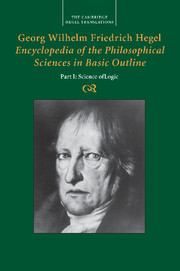 Georg Wilhelm Friedrich Hegel: Encyclopedia of the Philosophical Sciences in Basic Outline
Georg Wilhelm Friedrich Hegel: Encyclopedia of the Philosophical Sciences in Basic Outline Book contents
- Frontmatter
- Contents
- Acknowledgments
- Introduction: Hegel’s Encyclopedia Logic
- Translators’ Note
- Encyclopedia of the Philosophical Sciences in Basic Outline, Part I: Science of Logic
- Part I Science of Logic §§ 19–244
- Bibliography
- Glossary of Translated Terms, German to English
- Glossary of Translated Terms, English to German
- Index
Preface to the First Edition
Published online by Cambridge University Press: 30 September 2021
- Frontmatter
- Contents
- Acknowledgments
- Introduction: Hegel’s Encyclopedia Logic
- Translators’ Note
- Encyclopedia of the Philosophical Sciences in Basic Outline, Part I: Science of Logic
- Part I Science of Logic §§ 19–244
- Bibliography
- Glossary of Translated Terms, German to English
- Glossary of Translated Terms, English to German
- Index
Summary
The need to provide my listeners with a guide to my philosophical lectures first prompted me to let this overview of the entire scope of the philosophy come to light earlier than I would have otherwise thought appropriate.
The nature of an outline not only excludes amore exhaustive elaboration of the ideas in terms of their content, but also restricts in particular the elaboration of their systematic derivation, a derivation that must contain what is otherwise understood as a proof and that is indispensable for a scientific philosophy. The title was supposed to indicate the scope of the whole as well as the intention to reserve the details for the oral presentation.
In the case of an outline where the aim is to present an already presupposed and familiar content in a deliberately succinct manner, more consideration is given simply to the external purposefulness of the ordering and arrangement. The present exposition is not in this position. Instead it sets up a new reworking of philosophy according to a method that will some day be recognized, I hope, as the only true method, identical with the content. For this reason, I would have considered it more advantageous for the exposition, as far as the public is concerned, if circumstances would have allowed me to have a more elaborate work about the other parts of the philosophy precede it, a work of the same sort as I provided the public in regard to the first part of the whole, the Logic. Moreover, although it was necessary in the present exposition to limit the side of the content that lies closer to representation and empirical familiarity, I believe that, in regard to the transitions (which can be nothing other than a mediation effected by means of the concept), I have made this much evident: that the methodical character of the progression is sufficiently distinct from the merely external order that the other sciences look for, as well as from a mannerism that has become customary in treating philosophical objects. This mannerism presupposes a schema and in the process sets up parallels among thematerials just as externally as – and even more arbitrarily than – the first way does [i.e. the way of the other sciences].
- Type
- Chapter
- Information
- Georg Wilhelm Friedrich Hegel: Encyclopedia of the Philosophical Sciences in Basic OutlinePart I: Science of Logic, pp. 5 - 7Publisher: Cambridge University PressPrint publication year: 2010
